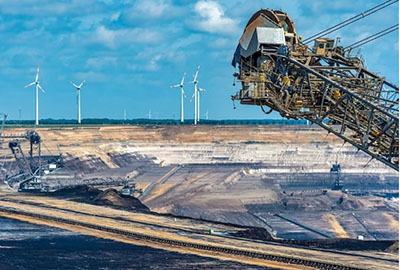by WorldTribune Staff, October 30, 2022
As it scrambles to find alternatives to natural gas ahead of winter, Germany has torn down a wind farm in order to expand operations at a nearby coal mine.
Eight of the turbines at the wind farm near the Tagebau Garzweiler lignite mine in the state of North Rhine-Westphalia were dismantled last week while two more are slated for removal next month. The additional turbines will be removed by the end of 2023.

Lignite, also known as brown coal, has been mined from Garzweiler for over a century, said the mine’s operator RWE, as OilPrice.com reported.
“We realize this comes across as paradoxical,” said Guido Steffen, a spokesperson for German energy company RWE. “But that is as matters stand.”
Last month, the German government ordered brown coal to be brought back to boost energy supply as Russian gas exports via the Nord Stream 1 pipeline dried up, The Guardian reported.
Earlier this month, German Federal Economy Minister Robert Habeck expressed concern that the nation could run out of gas this winter.
Habeck said Germany was facing an “extremely tense situation. If we don’t save, if households don’t reduce consumption, we still risk not having enough gas in the winter.”
Meanwhile, Europe will not be able to rely solely on imports of U.S. liquefied natural gas (LNG) to offset the pipeline gas supply it will have lost from Russia when it starts rebuilding inventories after the end of this winter, according to BloombergNEF.
So far this year, American LNG has been crucial in meeting demand in Europe, which is scrambling for gas supply and willing to pay up for spot deliveries, outbidding most of Asia.
Nearly 70% of all American LNG exports went to Europe in September, according to Refinitiv Eikon data cited by Reuters.
Ahead of the 2023/2024 winter, the gap in gas supply in Europe will be much wider without Russian gas.
Europe will not be importing much Russian gas — or none at all if Russia cuts off deliveries via the one link left operational via Ukraine and via TurkStream — compared to relatively stable imports from Russia in the first half of this year, before Moscow started gradually cutting volumes via Nord Stream in June until shutting down the pipeline in early September.
“The year-on-year increase is not sufficient to offset a total cut in Russian piped supply with under half of these volumes met by LNG increases,” BNEF analyst Arun Toora said.
“The good news is that Russia looks close to having played its last card in terms of gas leverage over Europe. However Europe’s challenges will not disappear with the daffodils next spring,” London-based consultancy Timera Energy said in a winter gas market outlook at the beginning of October.
Without most of the Russian gas supply, Europe will likely need to offset around 40 bcm (billion cubic meters) of additional lost Russian flows next year. LNG alone cannot meet this volume, considering a lack of new global liquefaction capacity in the short-term, including in the U.S., limited further demand elasticity in Asia, and European re-gasification capacity constraints. Therefore, European demand will need to fall, Timera Energy said.
Action . . . . Intelligence . . . . Publish
